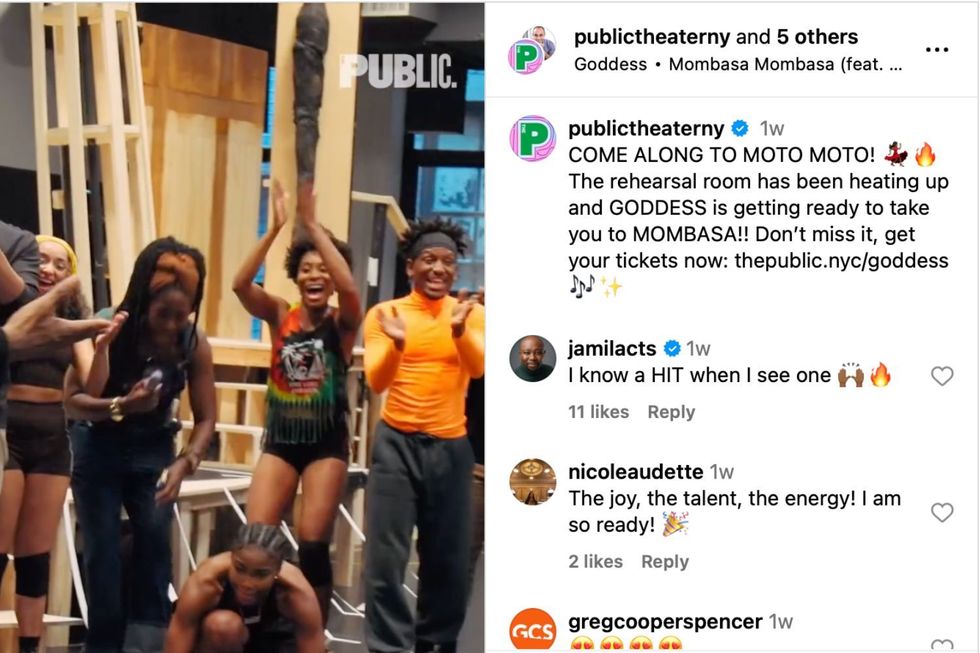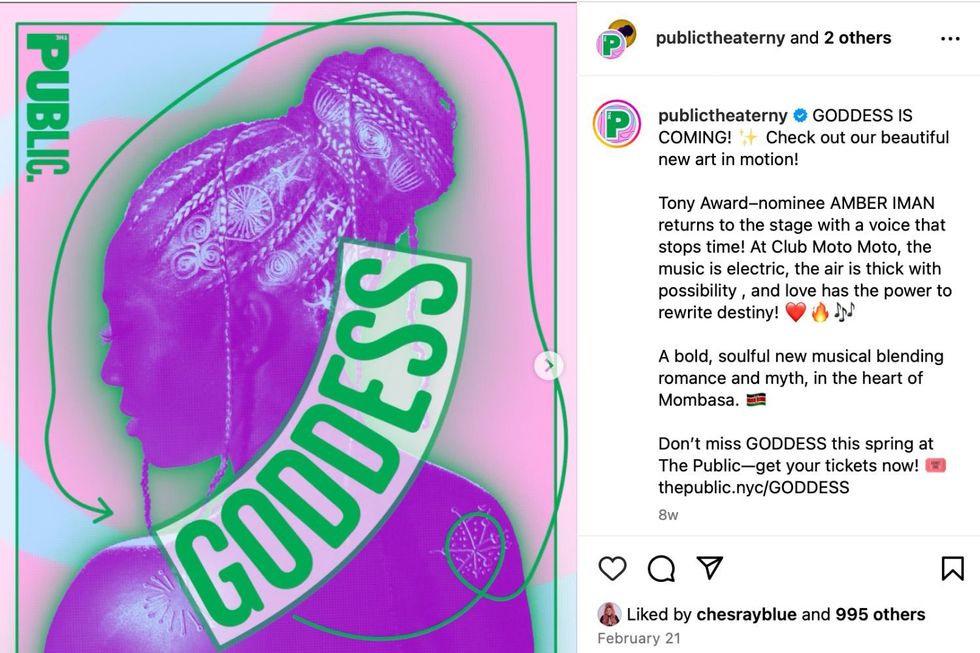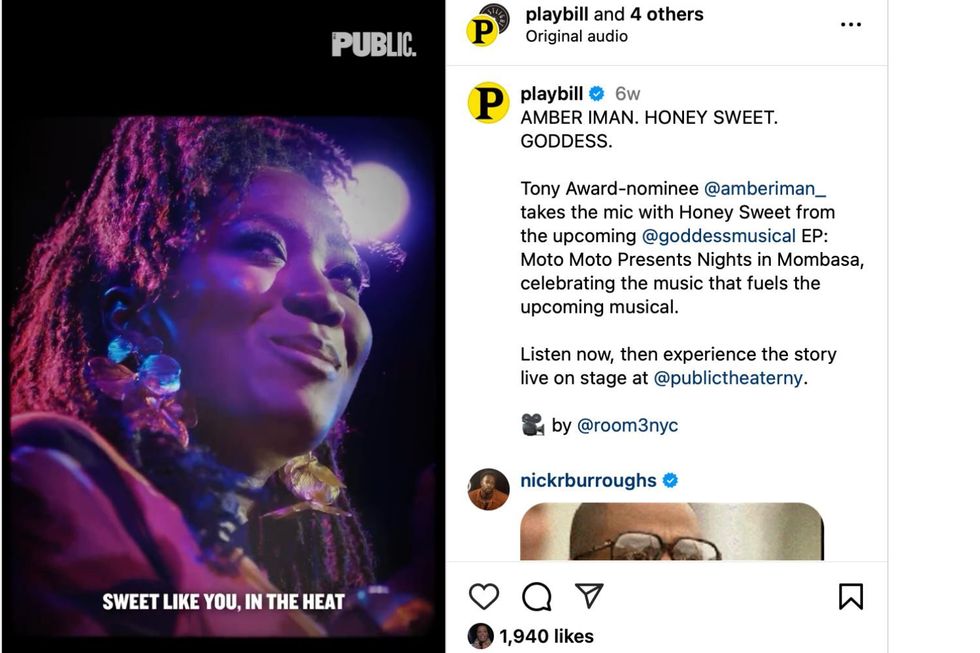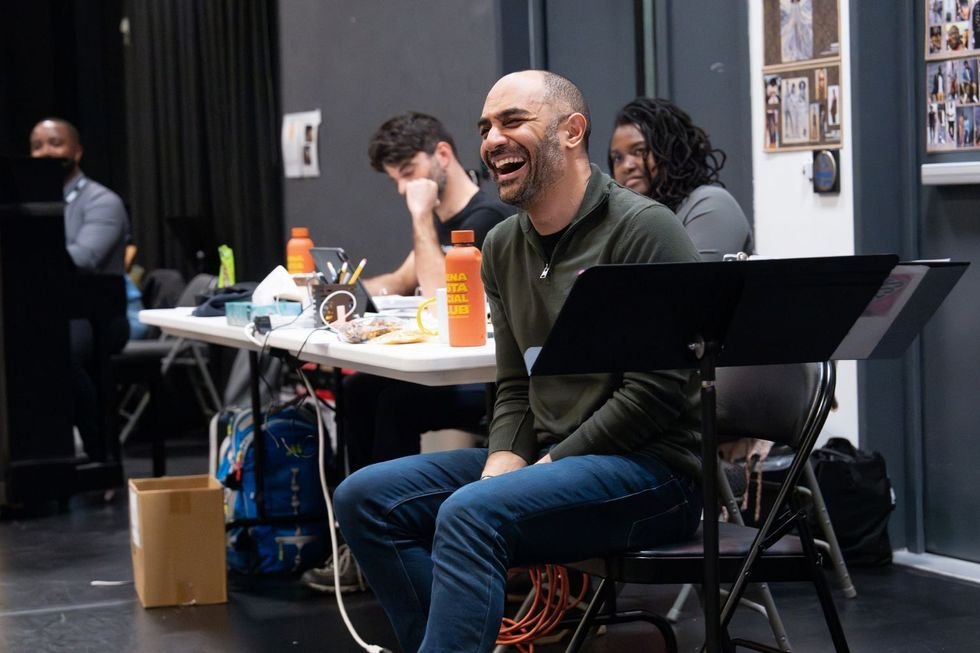
Saheem Ali‘s journey from Nairobi to New York has been guided by a deep desire to tell stories reflecting his roots. As a theater director working at the highest levels of American theater, he has long dreamed of creating work that speaks directly to the African experience.
That dream comes to life in Goddess, his new musical set in Mombasa, which draws from African mythology and cultural traditions. Inspired by the little-known myth of Marimba, the show follows a mysterious singer who arrives at Moto Moto, a steamy Afro-jazz club on Kenya’s coast. She bewitches everyone, including a young man recently returned from studying in America. As he prepares to follow his family’s political footsteps and marry his fiancée, one question remains: will her arrival change everything?
For Ali, who first fell in love with theater after watching Grease as a teenager, Goddess fulfills a lifelong vision. “I always wanted to create an original African musical … to bring a piece of my country to American theater,” he tells OkayAfrica. “Now that it’s happening, it feels incredibly personal and rewarding.” A Tony, Drama Desk, and Lucille Lortel nominee, Ali currently serves as Associate Artistic Director and Resident Director at New York’s Public Theater, where Goddess will begin previews on April 29.
Eighteen years in the making, Ali directed Goddess, with music and lyrics by Michael Thurber, choreography by Darrell Grand Moultrie, and additional book material by Pulitzer Prize-winning playwright James Ijames. The production represents a rare convergence of African storytelling and Broadway-caliber artistry.
In this conversation with OkayAfrica, Ali discusses the long road to developing Goddess, the cultural significance of staging African stories in American spaces, and why staying true to your voice as an artist can be the most powerful act of all.
This interview has been edited for length and clarity.

OkayAfrica: You grew up in Nairobi. What first drew you to the stage?
Saheem Ali: My dad was a pilot for Kenya Airways, and I went with him on one of his trips to London. While we were there, I saw this musical called Grease, and I was utterly blown away by it. At the time, I was a student at Jamuhuri High School [in Nairobi]. When I got back, I had the cassette I bought at the theater, and I was so inspired that I convinced my friends to put on the show with me. I just wanted to recreate what I had seen.
That moment inspired me to become a theater artist. I directed that production, choreographed it, and acted in it. We sang along to the cassette. It was a very bare-bones, lo-fi version of the show based on what I remembered from seeing it in London.
What about Grease got under your skin?
I loved the energy of it. I loved the music and the dance. It energized me. We were all teenagers then, and Grease is a story about teenagers falling in love, rebelling, and going through all of that. It was very relatable. I could see myself and my friends in it. It didn’t matter that those were white kids in America and we were Black kids in Kenya. That was completely unimportant. I was just so drawn to the energy of the piece.

You’re now bringing Goddess, an original musical set in Mombasa, to one of America’s premier stages. What does that feel like?
It’s pretty humbling. I have always dreamed of creating an original African musical. I didn’t know if it would be Kenyan or from somewhere else on the continent. It means a lot to have created this story and worked on it for many years with incredible collaborators and support from theaters, producers, and other artists. I wanted to bring a little piece of my country to American theater, and accomplishing that is very humbling.
Goddess draws on the myth of Marimba. How did you turn that myth into a musical?
I first heard about the myth in [school] during a literature class and was immediately struck by it. The idea that music could originate from a feminine deity was powerful. Then there was the tragedy of a mother so jealous of her daughter that she cursed her never to find love. Something about the emotional weight of that story stayed with me.
Years later, I was in the U.S., finishing my MFA in directing at Columbia, and thinking about my future and the path I wanted to take. I knew I wanted to create an original African musical. That myth kept coming back to me, so I started researching and found that versions of the Marimba story also exist in South and West Africa. There’s the figure of Mami Wata, for instance.
It became clear that when stories travel, they evolve. They take on new forms in different places. The Marimba myth felt like one of those stories with deep roots across the continent, so I began to draw from various versions to build something new.
Swahili language and culture are vital in the show. How do you bring that to an American stage?
One of the characters says, “Unazungumza Kiswahili?” (Do you speak Kiswahili), and the other responds with “Ndio, nazungumza Kiswahili!” (Yes, I do!). We don’t translate that for the audience, but it still communicates a moment of connection through language. It’s all part of what makes this story feel rooted in something real.
In Kenya, we grow up in a true cultural melting pot. People are generally aware of each other’s religions and traditions. Eid is a public holiday for everyone, and so is Diwali and, of course, Christmas. But when you come to the States, everything feels more siloed. Religious and cultural knowledge isn’t as commonly shared.
I wanted to bring that sense of community into the production, that everyday coexistence and mutual respect. It’s something I wanted to share with American audiences.
The show echoes your journey between continents. How do you express that tension in Goddess?
Yes, there is a recurring theme in a lot of my work. It’s this idea of leaving, of immigrating and emigrating. In Buena Vista Social Club, a musical I have in New York right now, the story follows two sisters torn apart by a revolution. One decides to stay, and the other chooses to leave.
In Goddess, there’s a story of a young man who returns from the States and is trying to reconcile his political family background with his artistic passions. I relate to that. I often feel this push and pull between where you were born and where you live, between your identity and the world around you. These are themes I know intimately from my own life. So, I keep coming back to them in my art. It’s my way of exploring and understanding those tensions more deeply.

You co-created the show with Michael Thurber and James Ijames. What was that collaboration process like, especially with a show with little source material?
I’ve had various collaborators who’ve helped the show evolve over the years. At the end of the day, it’s always rooted in where I’m from and the kind of story I want to tell. That has shifted as I’ve grown as a human and an artist.
Michael Thurber has been with me the longest. I’ve been working on Goddess for 18 years, and he’s been part of it for 16. It takes a village to make a theater piece, especially an original show without detailed source material. A lot of musicals are adapted from things that already exist, whether it’s a play, a book, a movie, or someone’s life. Goddess is different. The myth of Marimba is barely a paragraph long. We had to create every character and every situation from scratch.
Since it wasn’t based on any well-known story or IP, we had to figure out everything from the ground up. And no one had heard of it. If you say Goddess, people don’t know what that is. Most musicals on Broadway are built on something familiar. So creating something completely original, with no built-in recognition, was very challenging. That’s why it took this long. But every collaborator who joined helped strengthen and expand the show’s shape.
What must happen for more African stories like Goddess to thrive in the U.S.?
It’s really important to have partners who provide the resources to expand ideas. An idea is nothing without support. Theater is the most collaborative art form there is. You can work with other artists, but producers and institutions are also needed to support those stories.
I’ve been very fortunate to have producers who believe in Goddess. For the first ten years, I was self-producing the show. For the last eight, I’ve had extraordinary commercial producers come on board and say, “We’re going to support this. We believe this is a powerful show.” I wouldn’t have been able to do it without them.
Right now, my artistic home is the Public Theater in New York. The show is coming here because they believe in me and want to support my work. That kind of belief is essential. This show is a risk. The original myth is obscure. The music is all new. When dealing with something unknown, building the support system needed to bring it to life can be very difficult. That’s why we need more institutions and producers willing to take risks and support artists who are telling marginalized stories.
In Kenya, a student play was disrupted by authorities after it was found to mirror recent youth-led protests. What is the role of theater, and specifically the role of freedom of speech and expression in theater? What does it mean for a place, a community, a city, or a country to have a space where that kind of expression can truly thrive?
I’m not familiar with the story. However, theater is where people gather around a set of ideas as a community. Clearly, the government was threatened by what this play might provoke, and that reveals a deeper truth. It shows that theater will never die. It will always have a place because people want to come together and share stories.
Those girls were telling a story with real contemporary resonance. It was going to open eyes to a truth they were living through. It’s extraordinary that even a high school play can have such an impact that a government would feel threatened. That speaks volumes about the power of storytelling. It proves again the enduring importance of theater in our lives.
And finally, you have made a living through working in theater. What does that mean to you?
It’s pretty extraordinary. I count myself very lucky. Making a professional life in theater is challenging, and I’ve managed to do it in a way that feels truthful and authentic. I’m telling stories from my homeland, stories I care deeply about. Everything I’m working on is something I’m fully invested in and would defend with all my heart. That’s a testament to the power of being yourself, having confidence in who you are, and believing in the stories you want to tell.
Previews for “Goddess” start on Tuesday, April 29, at the Public Theater in New York through Sunday, June 8.














**mind vault**
mind vault is a premium cognitive support formula created for adults 45+. It’s thoughtfully designed to help maintain clear thinking
**breathe**
breathe is a plant-powered tincture crafted to promote lung performance and enhance your breathing quality.
thc for insomnia relief products available online
I am having a lot of fun with gk88slot. Payouts are frequent and the welcome bonus was stellar!
66b chính thức Bạn có thể thoải mái lựa chọn vật phẩm và vũ khí đa dạng để tiêu diệt con mồi hiện ra trên màn hình. Chưa dừng lại ở đó, với hơn 50+ boss khủng sẽ giúp ngư thủ mang về phần thưởng cực lớn với giá trị Jackpot hàng tỷ đồng.
Trong những năm đầu hoạt động, 66b online chỉ tập trung vào việc xây dựng nền tảng kỹ thuật vững chắc và thu hút người chơi bằng các ưu đãi hấp dẫn. Sau một thời gian ngắn, nhà cái đã mở rộng danh mục trò chơi của mình, không chỉ giới hạn ở cá cược thể thao mà còn phát triển thêm nhiều trò chơi khác như poker, blackjack và slot games.
Rongbbachkim, eh? Just gave ’em a looksee. Seems promising, alright? You might dig it! rongbbachkim
Yo, okkingcom? Heard it through the grapevine. Honestly, it’s decent. They’ve got a good selection of slots, and the live casino is pretty lively. Just remember to gamble responsibly, ya know?
Alright mates, gave q88bets a go and had a decent time. Game selection’s not bad, and the site runs smoothly enough. Could use a bit more variety in the promos, but overall, a solid shout for a punt. Check ’em out here q88bets.
Okay, so I was having major trouble logging into Sikkimgame! Found the official sikkimgameloginlink and it worked like a charm. Sharing it here in case anyone else is struggling!
Hey guys, just wanted to say KU19NET is my new go-to! Seriously, the games are popping and the wins feel oh-so-good. Give ku19net a try, you won’t regret it!
I don’t think the title of your article matches the content lol. Just kidding, mainly because I had some doubts after reading the article. https://www.binance.com/register?ref=IHJUI7TF
W88nhacai? Alright, alright, let’s hope this is the lucky spot. Gonna try my hand at some games and see what happens. Hoping for big wins! Get lucky with w88nhacai!
Tham gia 888SLOT là một quá trình đơn giản, nhanh chóng và bảo mật. Với giao diện được thiết kế tối ưu cho người dùng Việt Nam, việc bắt đầu trải nghiệm nhà cái đổi thưởng trở nên dễ dàng ngay cả với những người mới làm quen với thế giới giải trí trực tuyến. TONY12-16
It’s in reality a great and helpful piece of info. I’m satisfied that you just shared this useful info with us. Please keep us up to date like this. Thanks for sharing.
Downloaded the jjjtgameapk and it was pretty easy to install. The game seems interesting, and doesn’t seem to have errors during gameplay. Worth a try, I guess. Here jjjtgameapk.
Definitely believe that which you said. Your favorite justification seemed to be on the net the easiest thing to be aware of. I say to you, I certainly get irked while people consider worries that they plainly do not know about. You managed to hit the nail upon the top as well as defined out the whole thing without having side-effects , people can take a signal. Will likely be back to get more. Thanks